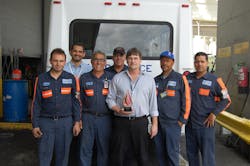Robert Wright: 2017 Team Leader of the Year
When Bob Wright entered the workforce, the aviation industry wasn’t exactly in his mind as his ideal career.
But, deep down, it was probably in his heart. After all, Wright came from an aviation family; his father retired from the FAA and his grandfather operated flight schools after his time in the Air Force.
While his own foray into aviation was more happenstance, Wright has developed a passion for his vocation while learning the ins and outs of all things ground support.
Today, with three decades of experience and industry knowledge, he is director of maintenance for Alliance Ground International (AGI) and Cargo Force, where he manages overall maintenance operations for both companies.
He oversees 100 mechanics across 20 locations throughout the United States and Puerto Rico, and his unique blend of mechanical and managerial skills sets him apart as the Ground Support Worldwide 2017 Team Leader of the Year.
“He understands how people operate equipment, how they abuse equipment and how to repair the equipment,” says Tony Romeo, who is chairman and CEO at AGI and Cargo Force and also owns Charter America, a GSE leasing company that offers a full line of all types of GSE. “You don’t find that too many times. You either find a mechanic, or you find a manager.
“Bob has all those talents,” he adds. “He’s a valued asset to the company and he’s very loyal.”
Working His Way Up
Even though he grew up around airports and other members of his family worked in aviation, Wright didn’t set out to secure the same type of career.
As a mechanic, he began working at an FBO repairing fuel trucks.
“I had worked on trucks before. I got there, and I thought ‘this is pretty cool,’” Wright recalls. “Then six months later they came to me and said, ‘Can you fix that tug?’ I thought, ‘Yeah, it’s got a motor. Of course I can fix it.’ It just went from there.”
Soon after, Wright was put in charge of the entire GSE department and a few months later, he was overseeing the fuel department, too.
Early in his career, he always said yes when approached about taking on more responsibility or working on new pieces of equipment. Wright credits his success to being open to new challenges, which allowed him to gather an array of information about different types of GSE.
In the early 1990s, Wright went to work for Romeo for the first time. When that company, Miami Aircraft Support, was sold approximately 10 years later, Wright took a job at a small GSE refurb and parts company in Clearwater, FL. There, he performed overhauls and refurbs, which helped him hone skills like fabricating, welding and painting.
Then in 2013, Wright teamed up with Romeo again at AGI and Cargo Force.
“He’s grown professionally very quickly,” Romeo says. “He gets along with his people that work under him, and they complete the work as he wants.”
A Mechanic and a Manager
A key reason for that positive relationship is Wright’s willingness to get dirty and turn wrenches with his team of mechanics.
“I’ve always been, for the most part, in a management position,” says Wright, who operates out of a modest office near the companies’ maintenance facility at Miami International Airport (MIA). “But I always kept my hands in the maintenance. Even when I was a maintenance manager, I was still a working maintenance manager.”
Wright studies the equipment so he can share as much knowledge as possible with his team.
“Nobody knows everything, and nobody can figure everything out,” he says. “But I know it’s part of my responsibility to help them and steer them in the right direction.”
Leadership Style
Elias Hane, account manager at Cargo Force, has worked with Wright for more than two years. Hane says Wright is approachable and his door is always open. In fact, the office coffee pot is located in Wright’s office.
“Normally, we face imposing leaders and natural leaders. I think Bob is a natural leader,” Hane says. “You don’t need to know he’s the director of maintenance or the one managing the situation. He leads, and people follow him and get involved with him.”
Cargo Force handles up to 700 flights per month at MIA, which can be chaotic at times. But Hane says Wright is often thinking two or three steps ahead and is ready with solutions when problems occur.
“I have had many situations on the ramp that are difficult to handle. If he sees me struggling, without interfering with my management, he helps,” Hane explains. “It’s wonderful working with him and having him on your side.”
Wright says he tries to remain positive and upbeat as much as possible. But he adds there are times when he has to be the disciplinarian – especially when it comes to striking a balance between keeping equipment operational while working within the constraints of his budget.
Leading by example is important to Wright, whether that means grabbing a wrench and diving into a repair or modeling the work ethic he wants from his team.
And with high expectations for his team’s quality of work, Wright will regularly inspect and audit repairs.
“When I go into a city, I try to spend the time to do an actual audit and really look at what they’re doing,” Wright says. “I look to see how their shop area looks. I look to see how the equipment looks. Is it clean? I don’t like dirty equipment.
“It’s our name on the equipment, in front of these airplanes. I don’t want it to look like trash,” he adds, noting Romeo demands the same, clean appearance.
Effective Communication
Clearly communicating with his crew at Miami, as well as at other locations, is critical for maintenance operations at AGI and Cargo Force to succeed.
As director of maintenance for both companies, Wright serves as a liaison between corporate headquarters and his maintenance managers.
To do so requires a lot of emails and phone calls, he says.
“I hold a conference call every week with my managers,” Wright explains. “It’s my time to get that smaller group on the phone at the same time to go over anything I know we need to address. They give me a good rundown of where they are at each station.
“Even though they’re all in different cities, what I wanted was for them to all come together and get to know each other. They all have the same kind of equipment, and they all deal with the same type of problems,” he continues. “They’ve all developed a pretty good camaraderie with each other.”
Wright emphasizes that the organization is one big team – not several small teams in each city. By working together, AGI and Cargo Force can accomplish much more, including combining the resources of both companies.
“Everybody has got a talent. If you can find what each person’s talent is and get them to share that with everybody else, now you’ve taken 10 people’s talents and thrown them together.”
Keeping approximately 100 mechanics on the same page throughout a nationwide network can be a challenge. But ensuring all the necessary GSE repairs are completed correctly with a limited staff can also be difficult.
“Between motorized and non-motorized equipment, a lot goes into it every day – even without any problems. It’s challenging, to say the least, because I have to be the motivator.
“But in one way,” he continues. “I think it’s an advantage because having a limited group of people means I know every one of them. I know every single mechanic by name. I know who they are and they know me,” Wright says. “I know who I’m dealing with everywhere – not just my managers, but every single mechanic. So that’s an advantage.”
Wright must also ensure his “old-school” mechanics have a firm understanding of the latest technologies while his younger, technology-focused employees develop a broad mechanical foundation.
No matter which background an employee has, Wright is approachable.
“If you don’t know something, be honest. Show him your need or the issue that you have, and he will help you accomplish whatever task you’re doing,” Hane says.
No Two Days Are Alike
Every day on the ramp is different, and Wright must use his time wisely, balancing several responsibilities.
While no two days are alike, in a sense, Wright says every day is similar.
“You’re going to come in, you’re going to figure out what needs to be worked on today,” he says. “What problems do we have to tackle? What are the priorities?”
The variety of work keeps things interesting for Wright and his team. He says the equipment used on the ramp has always been fascinating to him. But the equipment used today has changed and the technology has improved, which makes it even more intriguing.
Also, the non-stop pace of ground handling and cargo handling adds excitement – and stress – to the workday. The business pretty much never stops, he says.
“You have to make sure everything moves on time,” Wright says. “Our entire world is about not being delayed.
“We all answer our phones 24 hours a day because the last thing I want to hear first thing in the morning is ‘we took a delay.’ Because in our business, it’s a killer.”
Acknowledging Others
Wright credits the people he has worked with for helping mold him into a successful leader in the industry.
“I always like to give credit to the people who have affected my life in the business,” Wright says, noting he has learned from experiences at each professional stop he has made.
However, he says Romeo has had the biggest influence on his career.
“He was never a mechanic, but he always knew how important the equipment was to the operation,” he says. “Ensuring the customer is always taken care of was always the priority.
“He’s very tough. He’s very demanding,” Wright adds. “But he’s also fair. He knows when somebody’s working hard. He can tell the difference between real mechanics and 'pretenders.'”
As a result, Wright has similar expectations for his team. While mechanics have set schedules, Wright expects his managers to put in the effort necessary to get quality work completed on time. One of the highest priorties the company has is providing customers with the equipment they expect.
“I give my guys a certain amount of leeway, but I need the job done right,” Wright says, adding he takes pride in his work, and wants the same attitude out of his team.
With that, he recognizes not everyone is going to be on the ramp 24-7 like he may prefer to be.
“I’ve never been a vacation guy,” Wright says. “I’ve had to learn that normal people stop for lunch. Normal people take vacations. I’ve had to learn how to push without it feeling like I’m pushing.”
About the Author
Josh Smith
Editor
Josh Smith served as editor of Ground Support Worldwide as editor from 2016 through 2024. He oversaw production of the print magazine, created GSW's newsletters on a daily basis, and updated the latest news on AviationPros.com.

